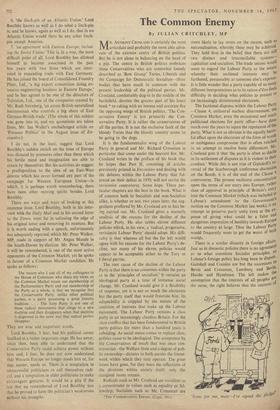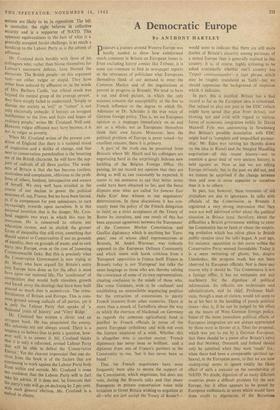The Common Enemy
By JULIAN CRITCHLEY, MP MR. ANTHONY CROSLAND is certainly the most articulate and probably the most able advo- cate of the extreme centre of British politics. But he is not alone in balancing on the head of a pin. The centre in British politics embraces those Conservatives who are somewhat loosely described as 'Bow Group' Tories, Liberals and the Campaign for Democratic Socialism—three bodies that have much in common with the present leadership of the political parties. Mr. Crosland, comfortably dug-in in the middle of the battlefield, devotes the greater part of this latest book * to raking with an intense and accurate fire the opposing wings of British politics. 'The Con- servative Enemy' is not primarily the Con- servative Party. It is rather the conservatives of all the parties. It is not the exclusive fault of the bloody Tories that the bloody country seems to be going to the dogs.
it is the fundamentalist wing of the Labour Party in general and Mr. Richard Crossman in particular that come under the heaviest fire. Mr. Crosland writes in the preface of his book that he hopes that Part II, consisting of articles previously printed in Encounter and dealing with the debates within the Labour Party that fol- lowed on their defeat in 1959, will not revive the revisionist controversy. Some hope. These par- ticular chapters are the best in the book. What is of concern both to Socialists and non-Socialists alike, is whether or not, two years later, the sug- gestions proffered by Mr. Crosland are in fact be- ing carried out. Mr. Crosland gives a masterly analysis of the reasons for the decline of the Labour Party. He also tables eleven different policies which, in his view, a 'radical, progressive, revisionist Labour Party' should adopt. His diffi- culty is that whereas all but the far left would agree with his reasons for the Labour Party's de- cline, too many of. his eleven policies would appear to be acceptable either to the Tory or liberal parties.
The root cause of the decline of the Labour Party is that there is no consensus within the party as to the 'principles of socialism.' It remains an ideological party at a time of immense social change. Mr. Crosland would give it a flexibility of response, yet it is not so much the electorate but the party itself that would frustrate him. Its adaptability is crippled by the nature of the coalition of interests that make up the Labour movement. The Labour Party remains a class party in an increasingly classless Britain. For the class conflict that has been fundamental to British party politics for more than a hundred years is subsiding. As social status comes to replace class, politics cease to be ideological. The acceptance by the Conservatives of much that was once con- troversial—the Welfare State and a degree of pub- lic ownership—dictates to both parties the frame- work within which they may operate. The great issues have gone, for they were the reflections of the divisions within society itself; only the marginal issues remain.
Radicals such as Mr. Crosland see socialism as a commitment to values such as equality or fel- lowship; Socialists such as Mr. Crossman are *THE CONSERVATIVE ENEMY. (Cape, 30s.) more likely to lay stress on the means, such as nationalisation, whereby these may be achieved. They hold firm in the belief that there are still two distinct and irreconcilable systems-- capitalism and socialism. The trade unions would seem to regard the Labour Party as the means whereby their sectional interests may be furthered, presumably at someone else's expense. It is little wonder that a party capable of so many different interpretations as to its raison d'être finds difficulty in deciding what policies to present to an increasingly disinterested electorate.
The factional disputes within the Labour PartY —Clause 4, unilateral nuclear disarmament, the Common Market, even the occasional and much publicised elections for party office—have done much over the years to injure the reputation of the party. What is not so obvious is the equally WM" ful effect upon the electorate of the form of words or ambiguous compromise that is often reached in an attempt to resolve basic differences. I'dt. Crosland puts it that 'the party is often as docile in its settlement of disputes as it is violent in their conduct.' While this is not true of Gaitskell's re- versal of the Scarborough conference discussion on the Bomb, it is of the end of the Clause 4 controversy. The present exclusive concentration upon the terms of our entry into Europe, rather than of approval in principle of Britain's entrY into the Common Market (which was included in Labour's amendment to the Government's motion on the Common Market last week), is an attempt to preserve party unity even at the ex- pense of giving what could be a false and dangerous impression of hostility towards Eurnlie to the country at large. Thus the Labour PartY would frequently seem to get the worst of both worlds.
There is a similar disunity in foreign affairs. Just as in domestic policies there is no agreement as to what constitute Socialist principles, s° Labour's foreign policy has long been in dispute. Gaitskell and Cousins are but the successors t° Bevin and Crossman, Lansbury and Sevin' Hardie and Hyndman. The left makes die assumption that the interests of all peoples aree the same, the right believes that the interests 01 'None for me, mate—I've signed the Pledger nations are likely to be in opposition. The left IS neutralist; the right believes in collective
security and is a supporter of NATO. This apparent equivocalness in the face of what is a generally accepted Soviet challenge, is as much a handicap to the Labour Party as is the advent of affluence.
Mr. Crosland deals harshly with those of his colleagues who, rather than blame themselves for Labour's successive defeats, have blamed the electorate. The British people—so this argument runs—are either vulgar or stupid. They have either been seduced by affluence or, in the words of Mrs. Barbara Castle, 'our ethical reach was beyond the mental grasp of the average person, they have simply failed to understand. 'Simply to dismiss our society as 'evil" or "rotten" is not only electorally imbecile; it betrays an arrogant indifference to the lives and fears and hopes of ordinary people,' writes Mr. Crosland. Well said. However vulgar affluence may have become, it is not as vulgar as poverty.
When Mr. Crosland writes of the present con- dition of England that there is a national mood of stagnation and a dislike of change, and that next to conservatism parochialism is the besetting sin of the British character, he will have the sup- port of radicals of all three parties. The weak- ness of Britain is that she has become rootless, motiveless and complacent, oblivious to the prob- lems of others, hesitant, introspective and unsure of herself. We may well have avoided in the course of our decline in power the political neuroses of, say, France, but we have been forced,
as if to compensate for past splendours, to turn increasingly. inwards upon ourselves. It is this
national inversion that is the danger. Mr. Cros- land suggests two ways in which this may be overcome. He is concerned to reform our education system, and to abolish the grosser forms of inequality that still exist, something that Should appeal to Conservatives if not on grounds of equality, then on grounds of waste; and to seek
entry into Europe, even at the cost of loosening Commonwealth links. But this is precisely what
the Conservative Government is now trying to do- Many who have argued for Britain's entry into Europe have done so for the effect it must have upon our national life. The 'accelerator' of competition that would both stimulate growth and knock away the shorings that have been built
around so much that is second-rate. The cross- fertilisation of Britain and Europe. This is com- mon• ground among radicals of all parties, yet it is only the Labour Party that speaks of `a thousand years of history' and `Vimy Ridge.'
Mr. Crosland has written a clever and an arrogant book. He has pinpointed the enemy. His solutions are not always sound. There is a tendency to believe that to pose a question, how- ever well is to answer it. Mr. Crosland thinks that it is only a reformed, revised Labour Party that will be able to defeat the 'Conservative nertlY.' Yet the clearest impression that one de- rives from the book is of the factors that are continuing to work against the Labour Party both from within and outside. Mr. Crosland is none too confident that the Labour Party will in fact take his advice. If it does not, he forecasts that the party's vote will go on declining by 2 per cent. With each general election. Mr. Crosland is a radical in chains.







































 Previous page
Previous page